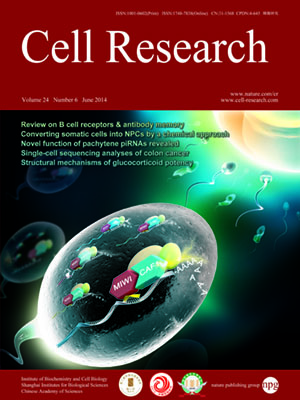Volume 24 Issue 6, June 2014: 701-712
ORIGINAL ARTICLES
Discovery of biclonal origin and a novel oncogene SLC12A5 in colon cancer by single-cell sequencing
Chang Yu1,*, Jun Yu2,*, Xiaotian Yao1,*, William KK Wu2,*, Youyong Lu3,*, Senwei Tang1,2, Xiangchun Li1, Li Bao1, Xiaoxing Li2, Yong Hou1,4,5, Renhua Wu1, Min Jian1, Ruoyan Chen1,6, Fan Zhang1,7, Lixia Xu2, Fan Fan1, Jun He1,2, Qiaoyi Liang2, Hongyi Wang8, Xueda Hu1, Minghui He1, Xiang Zhang2, Hancheng Zheng1, Qibin Li1, Hanjie Wu1, Yan Chen1, Xu Yang1, Shida Zhu1, Xun Xu1, Huanming Yang1, Jian Wang1, Xiuqing Zhang1, Joseph JY Sung2, Yingrui Li1 and Jun Wang1,9,10,11
1BGI-Shenzhen, Shenzhen, Guangdong 518083, China
2Institute of Digestive Disease and the Department of Medicine and Therapeutics, State Key Laboratory of Digestive Disease, Li Ka Shing Institute of Health Sciences, The Chinese University of Hong Kong, Hong Kong
3Laboratory of Molecular Oncology, Key Laboratory of Carcinogenesis and Translational Research (Ministry of Education), Peking University School of Oncology, Beijing Cancer Hospital/Institute, Beijing 100142, China
4School of Biological Science and Medical Engineering, Southeast University, Nanjing, China
5State Key Laboratory of Bioelectronics, Southeast University, Nanjing, Jiangsu 210096, China
6Department of Peadiatrics & Adolescent medicine, The University of Hong Kong, Hong Kong
7Department of Computational Medicine and Bioinformatics, Medical School, University of Michigan, Ann Arbor, USA
8Department of Surgery, Peking University School of Oncology, Beijing Cancer Hospital/Institute, Beijing 100142, China
9Department of Biology, University of Copenhagen, Ole Maaløes Vej 5, 2200 Copenhagen, Denmark
10Princess Al Jawhara Center of Excellence in the Research of Hereditary Disorders, King Abdulaziz University, Jeddah 21589, Saudi Arabia
11Macau University of Science and Technology, Avenida Wai long, Taipa, Macau 999078, China
Correspondence: Jun Wang, Tel: +86 10 80481662; Fax: +86 10 80498676 E-mail: wangj@genomics.org.cn; Yingrui Li, Tel: +86 10 80481662; Fax: +86 10 80498676 E-mail: liyr@genomics.cn; Joseph JY Sung, Tel: +852-37636103; Fax: (852) 21445330(jjysung@cuhk.edu.hk)
Single-cell sequencing is a powerful tool for delineating clonal relationship and identifying key driver genes for personalized cancer management. Here we performed single-cell sequencing analysis of a case of colon cancer. Population genetics analyses identified two independent clones in tumor cell population. The major tumor clone harbored APC and TP53 mutations as early oncogenic events, whereas the minor clone contained preponderant CDC27 and PABPC1 mutations. The absence of APC and TP53 mutations in the minor clone supports that these two clones were derived from two cellular origins. Examination of somatic mutation allele frequency spectra of additional 21 whole-tissue exome-sequenced cases revealed the heterogeneity of clonal origins in colon cancer. Next, we identified a mutated gene SLC12A5 that showed a high frequency of mutation at the single-cell level but exhibited low prevalence at the population level. Functional characterization of mutant SLC12A5 revealed its potential oncogenic effect in colon cancer. Our study provides the first exome-wide evidence at single-cell level supporting that colon cancer could be of a biclonal origin, and suggests that low-prevalence mutations in a cohort may also play important protumorigenic roles at the individual level.
10.1038/cr.2014.43
FULL TEXT | PDF
Browse 2826


